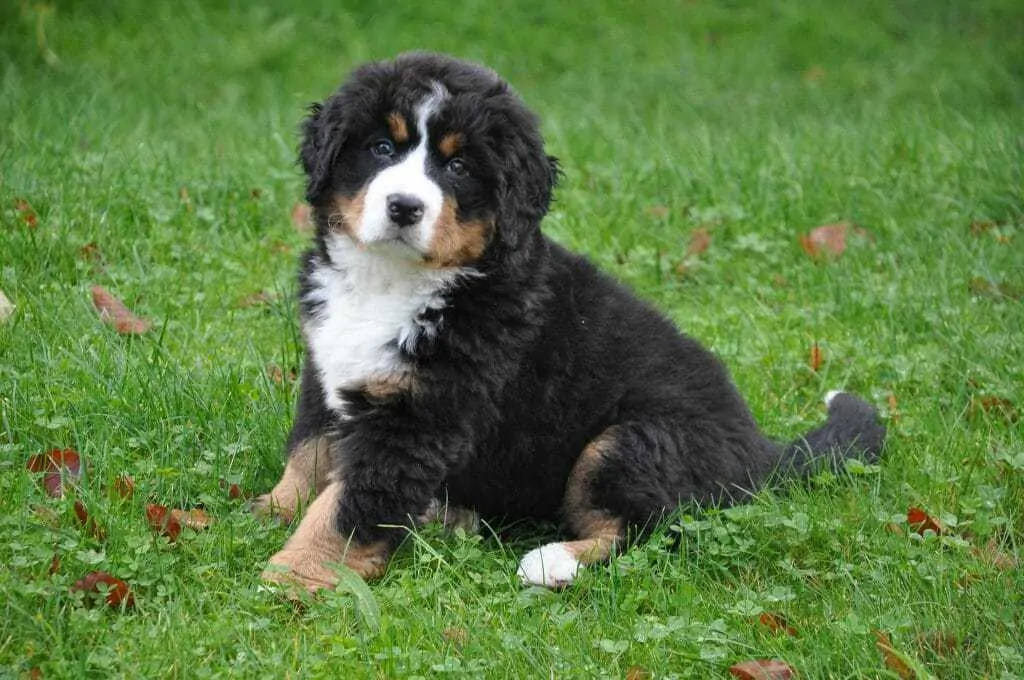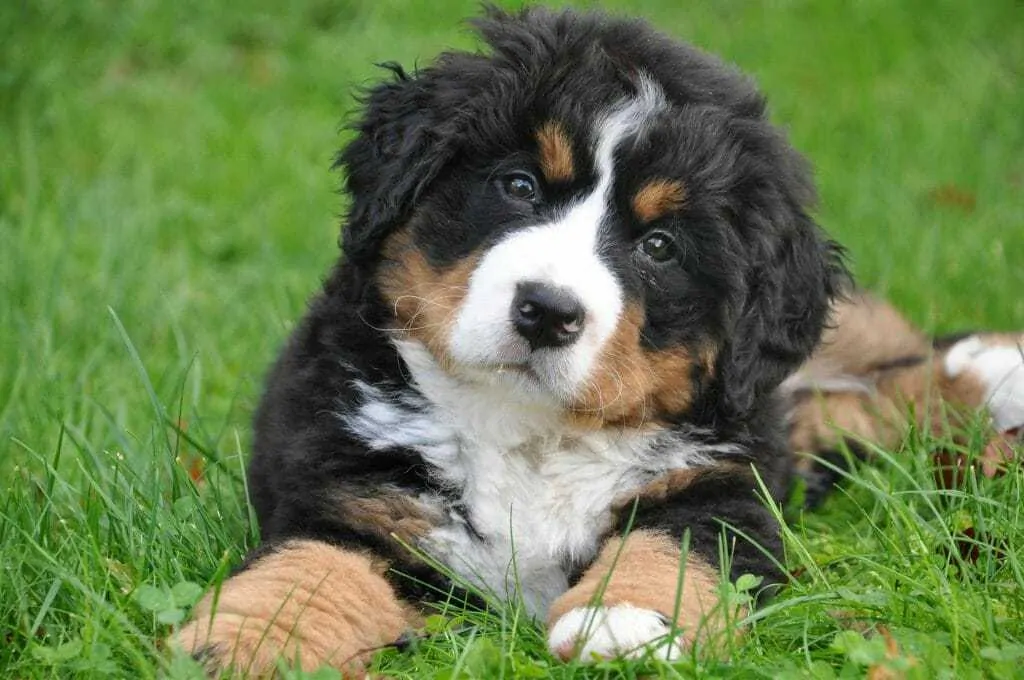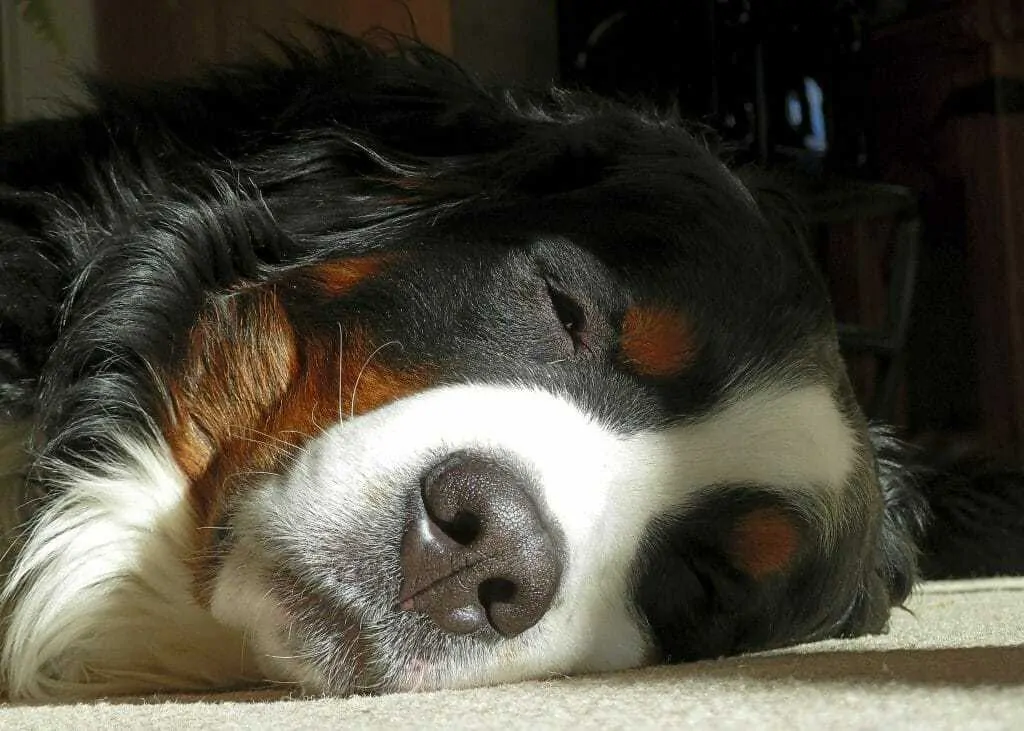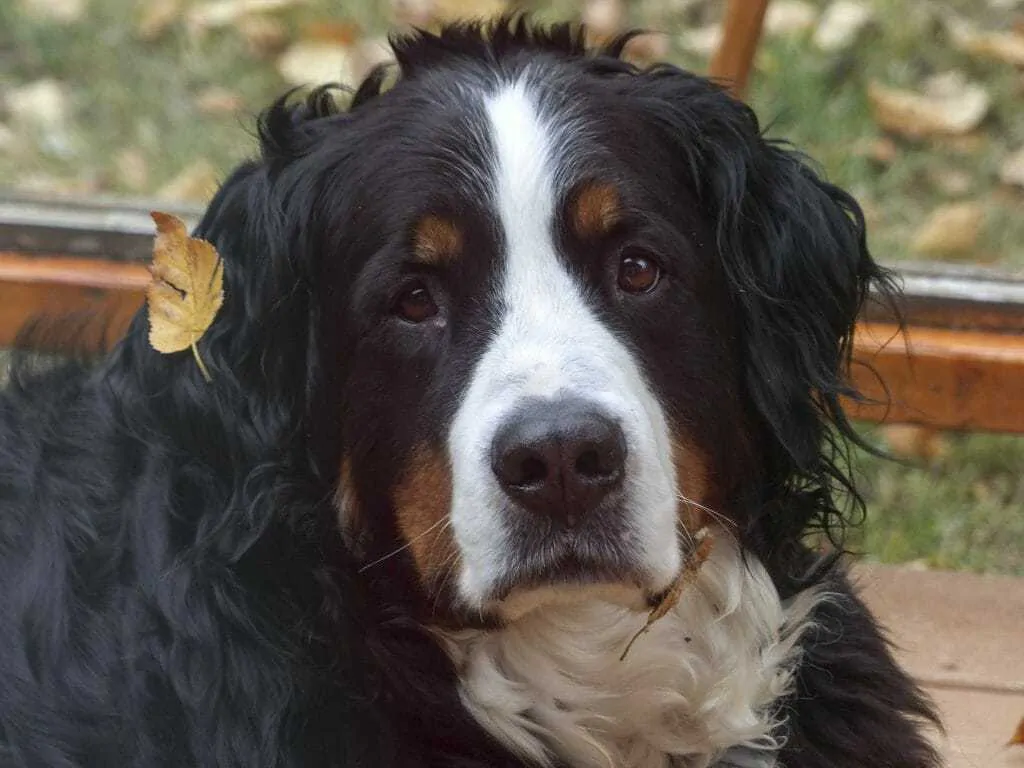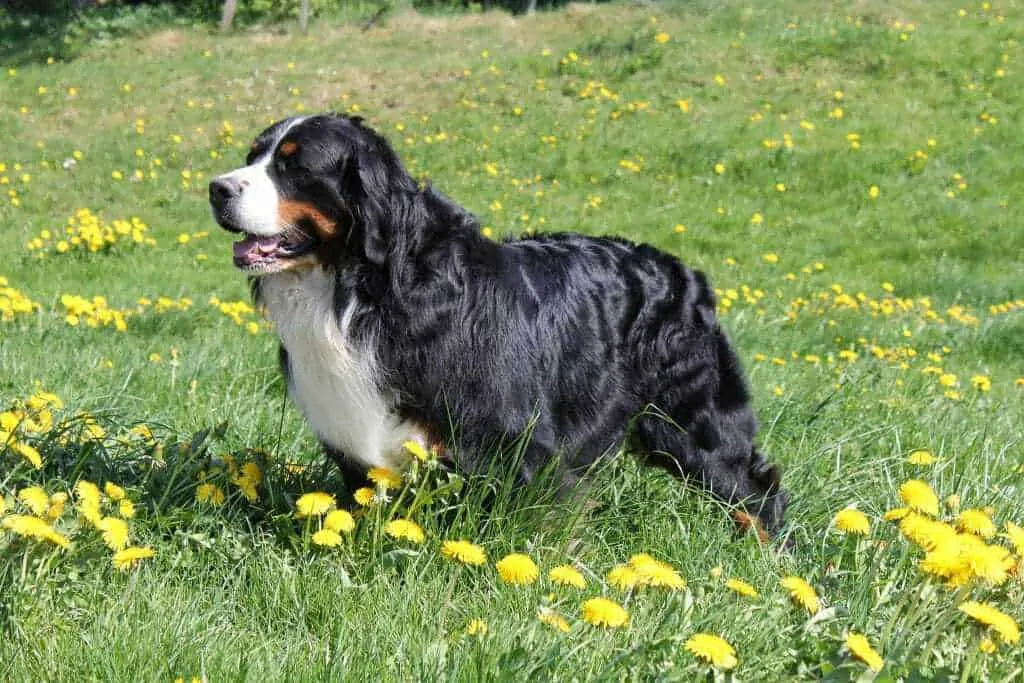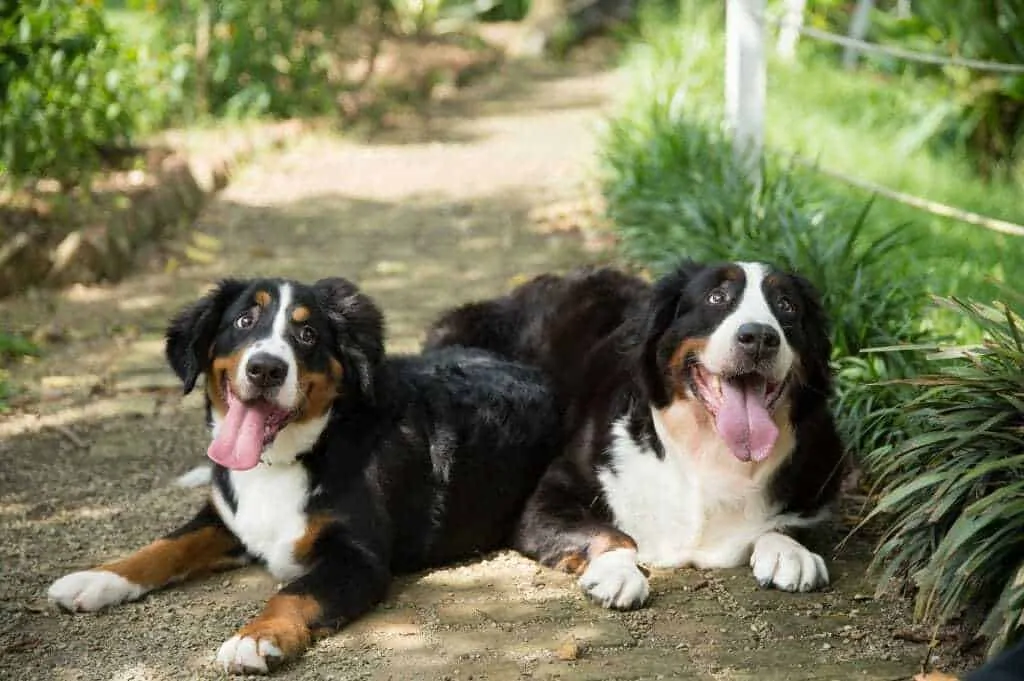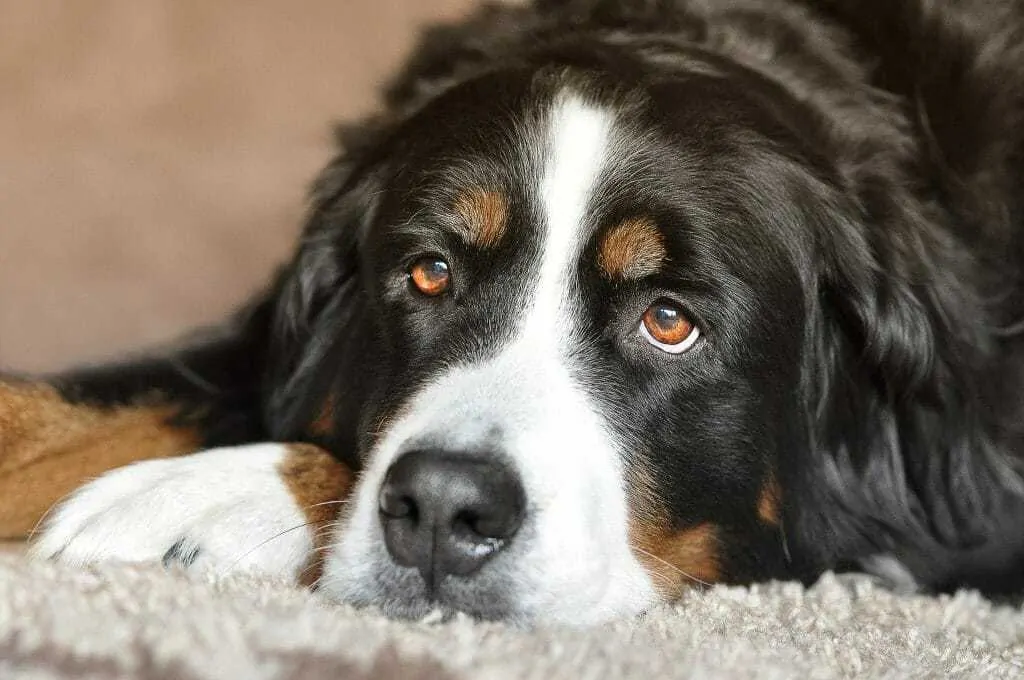Bernese mountain dogs are becoming popular family pets. Commonly referred to as Berners, these dogs have a particular look about them – they’re strikingly gorgeous with sweet eyes.
They are perfect canine companions to people who love large dogs and first-time dog owners. Despite being a large breed, they pack a gentle nature.
They are incredibly loyal and tally well with kids and could play with them all day.
The puppies look manageable and snuggly, and they have moderate exercise needs. They are also called; Berner Sennenhund or Bernese Cattle Dog.
The male Berners weigh somewhere between 100-160 lb while the females weigh somewhere between 90-140 lb. Their height ranges somewhere between 25-27.5 inches for males and 23-26 inches for females.
Bernese mountain dogs are massive dogs with distinctive tri-colored double coats. A Bernese mountain dog appears black with a white chest and rust-colored markings above the eyes, front of the legs, sides of the mouth, and a small amount around his white chest.
To learn more about this breed, here are 15 Things You Should Know About The Bernese Mountain Dog:
Contents
1. They originated in Switzerland
These gentle, beautiful dogs were initially used in Switzerland to herd cattle. Berners was originally vital to the farm life of the Swiss people as they served to drive cattle, pull carts loaded with farm produce to sell, and acted as watchdogs on the farm.
Alpine herdsmen used Berner Sennenhund as all-around farm dogs in the canton of Bern. They commonly hooked two Berners to a cart to help them haul milk.
It is believed that the Swiss Sennenhund breeds developed from a crossbreeding between the Mastiff-type dogs or the Molosser and the Swiss Alps. These four breeds include Greater Swiss Mountain Dog, Appenzeller Sennenhund, Berner Sennenhund, and Entlebucher.
Bernese mountain dogs have likely been working on Swiss farms for over 2000 years. In the Alps, they accompanied livestock, pulled carts, stood watch, and provided their owners with loyal companionship.
Consistent obedient training is necessary for Bernese Mountain puppies if you want a well-mannered adult Berner.
2. They nearly became extinct in the early 20th century
In the early 20th century, other means of transportation became easily accessible to farmers. Hence despite the breed’s utility at the time, mechanized farming and ranching brought the Berner’s numbers down.
When some Swiss fanciers noticed that the quality of the surviving Berners left something to be desired, they began to reverse the breed’s decline.
Under the leadership of Professor Albert Heim, a Swiss breed club was formed in 1907, and before long, these dogs have again favored farm dogs. They also started to catch up as canine companions with Swiss householders.
3. The American Kennel Club registered the first Berner in 1937
After the First World War, the first Berners were exported to Holland first, and then to the US. At the time, the breed had not yet been recognized by the AKC.
The first litter of Bernese Mountain puppies was born in England in 1936 when two British breeders started importing Berners. The Glen Shadow Kennel in Louisiana also imported two Berners, both male and female, from Switzerland in 1937.
The AKC then sent Glen Shadow a letter in 1937, acknowledging that Bernese Mountain Dogs had been accepted as a new working class breed.
The Bernese Mountain Dog Club was later founded in 1968, with 43 registered Berners and a total of 62 members. The club later became a member of the American Kennel Club in 1981.
The current Bernese Mountain Dog Standard was adopted in 1990.
Bernese dogs can be easy to train. However they don’t respond well to harsh treatment and punishment.
4. They have numerous health problems
Because of their small genetic foundation and other reasons yet to be discovered, Bernese mountain dogs have multiple health problems.
Currently, Berners have a lifespan of about 7-10 years, which is comparatively short. In Bernese mountain dogs, health issues include elbow and hip dysplasia, and other orthopedic problems.
They are prone to eye defects and diseases such as cataracts, progressive retinal atrophy, ectropion, and entropion. They are also susceptible to von Willebrand disease, which is a bleeding disorder.
Bernese mountain dogs commonly get affected by malignant histiocytosis, a fatal type of cancer. They may also experience neurological issues associated with malformation or degeneration of the cerebellum, a part of the brain.
However, it is impossible to predict whether your growing puppy will be free of these diseases. Hence, you must look for a reputable breeder who is known to breed the healthiest animals possible.
The breeder should be able to produce independent certification that the puppy’s parents were deemed healthy for breeding, and they were scanned for common health defects.
Luckily, the Bernese Mountain Dog Club of America actively participates in a health database known as Canine Health Information Center. Breeders are required to have all the test results, whether positive or negative, documented in the CHIC database before any Berners are issued a CHIC number.
You can find the test results on the CHIC website if you want to check the health of your Berner’s parents. A careful breeder will screen his breeding dogs for any genetic diseases. However, despite good breeding, your canine companion can still develop some of these health problems.
Unfortunately, most Berners are claimed by cancer, and there is no getting testing for cancer in place. Hence as a Bernese mountain dog owner, you should take every sign of lameness or illness, every bump or lump seriously, and visit the vet early to extend your dog’s quality of life.
Some Berners breeders set up the Berner-Garde Foundation to help improve the breed’s health by collecting and sharing information about some of the genetic diseases that affect Berners. The foundation also supports research meant to help reduce Bernese Mountain dog’s health issues.
Burners are also prone to gastric torsion and bloating. In this case, watch out for symptoms like pacing and restlessness, pale gums, drooling, lip licking, signs of pain, and trying to vomit without successfully bringing anything up.
If your Berner gets gastric torsion, we recommend stomach tacking. This procedure will keep your dog’s stomach from twisting again in the future. You can also opt to have this procedure done on your dog as a preventive measure.
Bernese dogs love children and love to play with them. It is also not uncommon for them to have a favorite person in the family.
5. They like to be with family and love being included in family activities
When you get a Bernese puppy, then you will notice that they tend to integrate into the family structure quickly. When they are young, they are very playful, and that trait doesn’t go away as they get older because they start looking for jobs they can do around the house.
As a working dog, he is also vigilant and self-confident, which makes him an excellent watchdog. Because they were initially bred to help farmers haul large carts around, Bernese mountain dogs will prove very helpful during family activities.
They are naturally inclined to help their owners and family get some work done, and they still love to work any chance they get. They can still herd, haul items, or guard your livestock or children if you need them to, and they do it with fierceness.
Berners will enjoy pulling your kids in a cart. You can also have them participate in drafting and carting competitions.
At their best, these dogs are calm and patient. However, to ensure your adult Bernese Mountain dog is tolerant and easy-going as an adult, you need to make sure he is adequately socialized and trained at an early age.
Due to their working breed heritage, Berners tend to be cautious, and sometimes it tips over into shyness. Early and frequent socialization will help stop them from being overly fearful or suspicious of anything different or new.
They also need early socialization to different sounds because they can also be sensitive to shrill cries or loud noises. Make sure you expose your Bernese puppy to many different household sounds and sights and people.
We recommend taking the puppies to kindergarten classes, outings to busy businesses and stores that allow pets, and tagging them along when you visit your neighbors or friends.
Starting training a Berner the day you bring one home. They are intelligent enough to soak up everything they are taught in just eight weeks. Failing to train a Berner early means you will end up with a headstrong companion on your hands.
Failing to socialize or train a Bernese early will leave you with a boisterous and unruly dog that will become even more unmanageable when they are fully grown.
The good news is that Bernese mountain dogs are relatively easy to socialize and train because they are naturally eager to please.
Use positive reinforcements while training and give them treats, praises, and rewards whenever they follow your command.
Due to their strong attachment, Berners don’t cope well with long periods of separation.
7. They need active exercise and mental stimulation
These dogs are not suited for condo or apartment living. They are more likely to thrive in a home with a large, secure fenced yard.
They are highly energetic dogs; hence, they need daily yard play and at least 30 minutes of active, vigorous exercise. They enjoy outdoor activities and will make great company on hikes and long walks.
You can also tag Berners along for backpacking and camping. You can enroll your Berner for canine sports such as herding, agility, rally, obedience, and tracking.
Bernese mountain dogs also need mental stimulation. Without mental stimulation, they get easily frustrated and bored, which often results in destructive chewing, digging, barking, counter surfing, and other undesirable behaviors.
You can give Berners interactive feeders like kongs, puzzles, or even play different games with them like hiding their favorite treats and toys.
Active exercise and mental stimulation will help keep your Berner happy and occupied.
8. They thrive in cold weather
Berners are genetically accustomed to living in cold, high altitude environments. Dog lovers who live in semi-tropical regions will not be suitable matches for Bernese Mountain dogs because the weather stays warm all year, which means your pup will be miserable.
Their thick coat makes them a natural fit for the cold climate. Conversely, because their thick coat is mostly black, they are prone to heat strokes.
Hence Bernese mountain dog owners should not allow their mutts to exercise when it’s hot outside. We recommend limiting their exercise sessions to when it’s cooler, most likely in the early mornings or evenings.
When it’s hot, keep them cool either using air-conditioning or fans when inside, and shades when outside.
Their favorite season is winter because they love to play with the snow, they enjoy long walks on cold days, and running in the rain.
Bernese mountain dogs will do well with a large, fenced yards.
9. They shed a lot during summer seasons
Because they are more suited for the cold weather, Berners develop two coats every year. When it’s winter, their coats are thick, and during the summer, their coats appear thinner.
Dog owners with allergies or who have someone in the family who is allergic to pets should reconsider getting a Bernese mountain dog because they tend to shed significantly during summer months.
During winter, you will have to brush his coat daily to prevent the fur from dropping off their body. Berner owners with small spaces may find themselves vacuuming each day.
10. They require weekly brushing and occasional grooming
Berners are shedders. They tend to shed moderately throughout the year and heaving when in summer, fall, and spring.
Weekly brushing is recommended to help reduce the amount of fur around your home and also to keep the coat tangle-free and clean. To further maintain their neat appearance, periodic bathing is essential every three months or so.
Use a metal comb or slicker brush to work out any tangles. You should also trim their nails as regularly as possible since long nails can cause canine companions’ structural problems and pain.
Brush their teeth at least twice or thrice a week to remove bacteria lurking inside the mouth and to remove tartar buildup. To prevent bad breath and gum disease, daily brushing is recommended.
Check their ears weekly for bad odor or redness, which are indications of an infection. To help prevent ear infections, use a cotton ball damped with a ph-balanced ear cleaner when you are checking the ears. Only clean the outer ear and avoid inserting anything into their ear canals.
This active breed requires daily exercise. They are not well-suited for apartment living.
11. They get along with children and other pets in the household
Because Bernese mountain dogs are very affectionate, they generally do well with children and other pets in the house. They are patient in nature and will take well when kids want to climb over them.
They are gentle with kids because they seem them as valuable members of the family. However, even though a Berner can sum up to be a large, lovable Teddy bear for kids, any play-time between dogs and children should be under supervision.
They also don’t mind other pets in the household, as long as they were gradually and safely introduced to them when they arrived. However, because of their great size difference, supervision and training are required to keep other animals or pets in your home safe.
12. They have a wicked sense of humor
This breed is among the most intelligent dogs in the world. Berner owners have noticed that the gleam in their eyes can indicate that the dog is about to perform a dog prank on you. Hence, it’s more than a reflection of their intelligence.
One of their favorite games is stealing your keys, shoes, or other items in the house. They are also large enough to become a tripping hazard, so they tend to sneak up behind your feet and stay there waiting for you to stumble over them.
You should be wary of spooking your Bernese mountain dog just for a laugh because they will most likely get even with you.
After being outdoors, always check a Berner’s ears for debris and clean them when they need cleaning.
13. They are one of the most faithful canine companions
Bernese cattle dogs are one of the most affectionate dog breeds today. They are known to be loyal to a fault because they always want to be near their families 24/7.
They have protective and hard-working personalities, which are some of the best traits in any dog breed. They don’t mind a little horseplay even when they are experiencing elbow and hip health problems.
Failing to spend time with a Berner can result in a higher risk of behavioral issues.
14. They frequently suffer from severe anxiety
Because of their friendly nature, Bernese cattle dogs love to give positive attention whenever possible. As a Berner owner, you should be prepared to be covered in drool daily.
However, as much attention these dogs are willing to give; they also expect to get the same attention from their owners to maintain constant positive mental health.
They tend to develop aggressive behaviors whenever you ignore them. They also get severe anxiety attacks when their favorite person leaves them all day.
Don’t be surprised when you come home to find your shoes chewed up or to find the stuffing in your couch removed. Berners have extreme anxiety levels when left alone.
15. They need a lot of space due to their size
Bernese mountain dogs are not the right dogs for those living in small homes or apartments. They need a lot of indoor as well as outdoor space to explore.
If you want a Berner to thrive and be happy, you need to take advantage of their working intelligence. Even home in urban settings with adequate space may not be a good fit for these dogs because they won’t get enough stimulation.
Bernese cattle dogs naturally love to help with work in the garden, dragging anything around the neighborhood, as well as staying active on farms. Failing to tap into their working traits will affect your relationship with your new canine companion.
